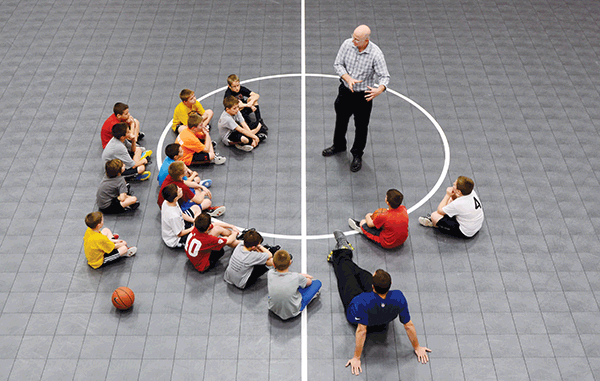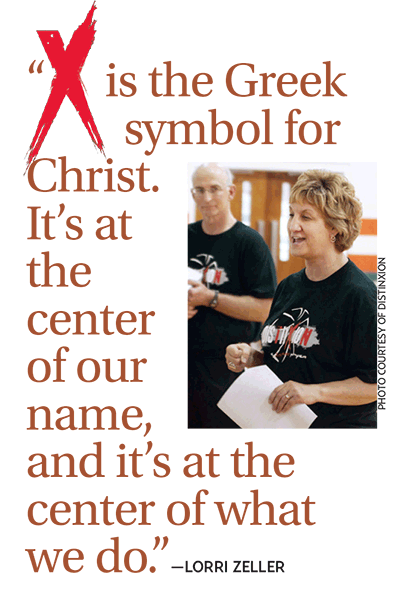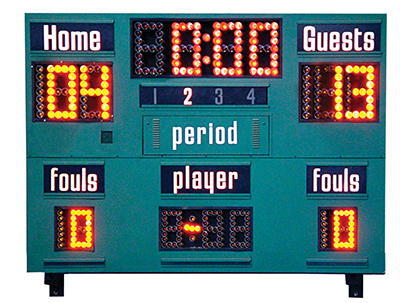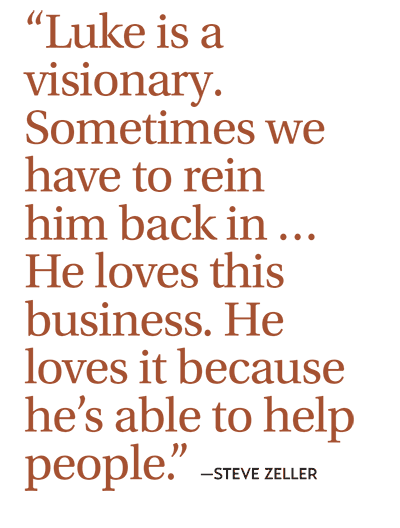Indiana’s bailiwick is basketball. The state’s love of the game is renown and real. And while a handful of Hoosiers can lay claim to a vein of hardwood lineage running in their family tree, Hysteria historians would be pressed to find any stronger or deeper than what Steve and Lorri Zeller transplanted in the fertile soil near Washington when they moved here in 1993. Then, their three sons, Luke, Tyler and Cody, were saplings.
But the boys grew … and grew. Following in the shoes of their parents, an uncle and a grandfather, they picked up the round ball Hoosiers love. The net result was nothing but net: Among the trio, they have four state class 3A championships, and each has an Indiana Mr. Basketball award to his credit. All three went on to play for storied Division 1 college programs. The oldest two, Luke and Tyler, now mix it up with the game’s elite as rookies this year in the NBA, while “little” brother Cody has reaped loads of press and praise helping restore the Indiana University men’s basketball program to prominence.
But basketball isn’t all that drives the Zeller boys. Above the game and fanfare, they each possess an abiding faith, strong character and work ethic, and a deep love and commitment to their family and community. These qualities were instilled by their parents and run as deep in the family as the game they play so well.
The Zellers are committed to sharing what they know about the game and the character needed to succeed in basketball — and in life. The family’s DistinXion program is gearing up for its fourth season — with 15 camps for boys and girls in Indiana, Ohio and North Carolina. The Christian-based program teaches positive life values and character through elite basketball and cheerleading instruction. The camp started with 38 youngsters in 2010. That number grew to 280 in 2011. Last year, some 1,300 boys and girls around Indiana and Ohio participated in 12 camps.
Electric Consumer met with Lorri and Steve Zeller, Daviess-Martin County REMC consumers, to talk about the program that also includes their sons; Luke’s wife, Hope; and a growing staff of others. While Steve has maintained his day job managing Perdue Farms’ Washington plant, Lorri has left her position in Washington High School’s athletic department to devote full attention to the nonprofit program. Here’s a portion of that conversation.

Steve Zeller talks about the importance of preparation to DistinXion’s AAU team during a practice at DistinXion’s gym at the Antioch Christian Church in Washington last month.
A camp with a difference
Electric Consumer: Luke is actually the president of DistinXion. How did he develop this idea?
Lorri: When he went to Notre Dame, he studied entrepreneurship. His business plan was to start a Christian basketball camp.
Steve: It really started before that when we were going to the AAU [Amateur Athletic Union] games when he was in seventh grade. He always said, “I want to do a basketball camp.”
 Lorri: This was his brain child that he’d dreamt of since he was probably 9 or 10 years old.
Lorri: This was his brain child that he’d dreamt of since he was probably 9 or 10 years old.
EC: Was the character aspect something you initiated with him, or did he see this was a missing element even at that age?
Steve: He started it. He really did. We talked a lot about the camp and how we wanted to do it. Basketball and character were the two things that always came up. Luke always was — still is — a very giving person. And he wanted to always give back.
Lorri: Through our experiences you see a lot. When you have summer AAU, you see … [pauses] … you see a lot — let’s just leave it at that. I worked at the school. You see not all kids have a mom and a dad. There’s just a need for that to be reinforced.
EC: A lot of star athletes and coaches have camps. What makes yours different?
Lorri: For one, it’s nonprofit. And secondly, the character and the life skills are different.
Steve: The other thing that we do that’s unique, and we’re going to keep it that way, is that we keep the number of campers per counselor low. We want to make it personalized.
At a lot of these camps, you’ll get 500 or 600 campers because they want to make the big bucks. All they want to do is one or two camps a year, and they’re done. We get more payment out of being able to help a kid and the families than from the money we get. Unfortunately, you have to have money to run the business or you can’t keep it going.
 EC: DistinXion’s numbers have grown incredibly over the first three years, but as you noted, that’s with a dozen camps in two states. Cody is listed as a staff member. As you’ve added more camps, do you think the success he’s had his first two years at Indiana University brought more attention to the camp?
EC: DistinXion’s numbers have grown incredibly over the first three years, but as you noted, that’s with a dozen camps in two states. Cody is listed as a staff member. As you’ve added more camps, do you think the success he’s had his first two years at Indiana University brought more attention to the camp?
Lorri: That definitely helps. But part of it, though, is parents see the need for the character training. It goes over great with parents, but the kids really hone in to it, too.
EC: Another thing unique about DistinXion is the name …
Lorri: When Luke did his business plan, he first named it “Summit Athletics,” as in reaching the summit. After we had our first pilot summer, he would see things around town like “Summit Realty,” or “Summit … you know” …. One day, he saw “Summit Sewage,” and he said, “That’s it. We need a new name!”
He and Tyler and Steve had been trying to think of a name. And, you know, they’re not very creative. Luke said they had ideas like, “We’re tall; come to our camp” … [Laughs]
Steve: … “We need nose surgery; so help us out. Come to our camp.”
Lorri: None of which got approved. So Luke’s wife said, “You guys stick to basketball, and let me do the marketing part of it.”
 She wanted something that meant distinct. That’s how we wanted to be: different. We say, “We’re different in a positive way.”
She wanted something that meant distinct. That’s how we wanted to be: different. We say, “We’re different in a positive way.”
At camp, our head trainer, Bryce Bow, will tell the kids, “You want your teacher to remember you not because you’re the kid causing problems. You’re the kid that held the door open for somebody. You’re the kid that said ‘please’ or ‘thank you.’ You’re distinct, you’re different in a positive way.”
So, with DistinXion, she changed the spelling. The center is a red “X.” X is the Greek symbol for Christ. It’s at the center of our name, and it’s at the center of what we do.
Steve: When Hope first brought that to me, I right away said, “No.” My mom always said never put “Xmas” because you’re “crossing Christ out.” Hope was prepared. She had it all laid out what the X stood for.
EC: The name has the Christian emphasis, but it seems the stories you use to illustrate the guiding principles of your “CHAMPIONS” acronym [please see sidebar] are the kind of examples any kid can relate to. I guess I’m asking whether children of other beliefs would feel as comfortable attending your camps?
Lorri: While the “X” in DistinXion represents Christ, we do not overwhelm the campers with this. However, we have small things that we do to bring in the Christian principles.
At the beginning of every camp, we have the score on the scoreboard at “4” and “13”. The scoreboard doesn’t change during the three-day camp. We will have some campers ask about the score. At the closing ceremony, we explain to the kids and parents that the number on the scoreboard is 4:13, which is Luke’s favorite Bible verse, Philippians 4:13 — “I can do all things through Christ who strengthens me.”
And Luke will explain what that has meant to him, and he is available for anyone who wants more information.
EC: Is there a certain type of youngster you hope to attract to the camp?
Lorri: We want a variety of kids. There are kids that are doing great, and we have a message for them. There are kids that aren’t doing so well, and we have a message for them, too. So, it doesn’t matter where they come from or what their story is. We just want them to come and experience it.
EC: What are some examples of how you teach character?
Steve: We start off by doing things like first impressions: a handshake, eye contact. And then the second thing we’ll go to is the table manners.
The best table manners actor we have is Cody. He’s the bad guy. He comes and does everything wrong. Cody will come out with a hat on backwards. His chair will be turned around. He reaches across the table, and he coughs in his hand. And then the kids start pointing it out. They get a big kick. One: it’s Cody; and two: they get to point out everything he’s doing wrong. It sticks in their mind, and we give them a talk at the end not to be like that.
EC: How much do Luke, Tyler and Cody’s busy schedules allow them to participate in the camps?
Lorri: It always depends. We try to have at least one of them at each camp. We don’t promote it as all three boys are going to be there. We really want it to be that you’re coming not for an autograph, but to improve your basketball skills and be a better person when you leave.
EC: When talking to the kids, how do you know they’re listening?
Steve: Occasionally, we’ll get one that won’t. We’ll draw attention to them. If they’re requiring too much attention, I’ll pull them aside and say, “Hey, here’s the way it’s being viewed, here’s the way you’re being looked at.”
We explain it to them that way rather than “you’re doing this wrong” or “you’re doing that wrong.” Go after the behavior, don’t go after the personal end of it. And it seems to work.
I think kids don’t get enough of that. Sometimes, I think parents are afraid to say to their child, “Hey, let’s just take it aside here.”
EC: These parenting and communications skills … were they the same ones you practiced on your sons?
Lorri: We were pretty strict.
Steve: Lorri was definitely a better person as far as laying down the rules. We were a nice combination because I could sit back and still be the threat if Lorri got into a situation.
Lorri: We had the advantage that there were two of us. There are a lot of households that don’t have that. There’d be times the boys would challenge me, and Steve would back me. But if that happens and you’re a single parent, then it’s tough.
EC: As you travel around and meet so many kids, do you think parents, in general, are shirking that responsibility of teaching kids character?
Steve: Parents have to be reminded that it’s OK to discipline your kid. It’s OK to be a parent. Anymore, it seems, parents want to be friends. It’s great to have that relationship, but you also have a responsibility of being a parent.
We as human beings want to be disciplined. When I say “disciplined,” I’m not talking about being spanked. We want to stay between the ditches. We don’t want to be down in the ditch.
Lorri: We tell parents, “Your children have friends. They don’t need you to be a friend. They need you to be a parent. That’s your job.”
Kids need boundaries, and that’s the parents’ job. So, we hope to empower parents to do that.
Now, I can say that, as my kids are in college or beyond, we’re really good friends. It’s OK to be friends now. I don’t have to make rules or boundaries for them. But at the time, I was not their friend; I was their parent.
EC: Is this where basketball — with its boundaries and rules — intersects with your larger message?
Steve: Any sport works this way. When you think about what we prepare for when we’re preparing for basketball, so much of it falls right into line with what you do in life. You work hard to achieve a goal. You have to prepare. You have to have put in the time.
Life happens so much faster in basketball. One of the things the boys have learned more than anything else, and we’ve learned as well, is that they get in a year probably 10 years of business. When you look at the basketball season they’ve gone through: they learn teamwork; they learn who are the authorities; they learn the people who will try to take advantage of them. They’ve learned so much. It took me 28 years to learn what they’ve learned in a four-year career in college. And now they’re learning more — beyond me — in the pro ranks.
Hoosier thanksgivings
EC: In Indiana, basketball seems to come into every kid’s life at some point. Very few, even the tall kids, go on to play in college, let alone the pros. What is it about Luke, Tyler and Cody that made them want to excel in the sport, and work at it far beyond the average kid to achieve their amazing success?
Steve: Luke was definitely the pioneer. He was a great older brother. Luke was 6-foot-9 in the eighth grade. So he got a lot of exposure. Basketball just came naturally because he was so tall.
Then, you had Tyler come along. Tyler’s very strong willed. Tyler, at one point, wasn’t too excited about basketball. He was 5-foot-11 going into ninth grade. He then grew almost a foot, and by his sophomore year, he was starting on the varsity. So, he had the will to push on.
As far as natural athletic ability, Cody’s always had the most. Cody could have been almost anything. He always jokes, “I would’ve been a great wide receiver if you would’ve just let me play football.”
EC: Since each is at or about 7 feet, they seemed destined to play basketball. But did moving to Indiana contribute to their success? Had you stayed in any of the places where each of the boys was born, do you think you’d have two sons in the NBA and the third heading that way?
Steve: I always say I wasn’t smart enough to bring us to Indiana. The good Lord brought us here, if you think about where we were.
We were in Iowa. I raised my hand when Louis Rich said we’re going to start a plant in California, and I took Lorri kicking and screaming to California. Then, from California to Minnesota.
Iowa is all wrestling. California, you’re not real sure because there are so many people out there. Minnesota is all hockey. And we end up in Indiana with 7-foot kids. It definitely made an impact.
Lorri: Iowa thinks they’re a big basketball state. But they’re not compared to Indiana.
Steve: We’ve seen the best in basketball in high school in Indiana.
EC: All three boys now wear the jersey number 40. Is there any significance to this?
Lorri: All of our boys have worn jersey #40 because it was worn by my dad, Marvin Eberhard. He wore it when he played high school basketball in Nebraska, and they won the state championship in 1942. So, that number has been special in our family, and our boys wear that number to honor him. He is now 88 years old and still lives in Iowa.
When the #40 was already being worn at North Carolina, Tyler wore #44 in honor of my brother Al Eberhard who wore that number in college and in the pros.
EC: Tyler was drafted right out of college last year. But this is also Luke’s first year playing in the NBA, after playing abroad and in the developmental league. Was there a time when he thought the NBA wasn’t going to happen for him?
Steve: The “P” in CHAMPIONS is for “perseverance.” We use him for perseverance because he has persevered without a doubt. He went from the pinnacle — scoring the state championship last second half-court shot — to going to a rough college career. It was a good career, but it wasn’t a great career like everyone anticipated. He went undrafted. He went to Japan. And he’s just stuck with it. He’s definitely persevered.
EC: Beyond basketball, what’s Cody studying at IU that perhaps he’ll later be able to bring to DistinXion?
Steve: Business, also … Luke and Tyler tried talking him into going into nursing because they felt we really needed a medical staff — and they didn’t think he was smart enough to be a doctor. [Laughter]
I’ve heard his older brothers explain all this to him … [More laughter]. They have fun with each other. It’s just fun to sit and listen to them.
Lorri: Here’s an example of Cody. That was him that just tried to call, and I just text-messaged him. I said, “We’re in an interview, but I’ll call you when we’re done.”
He goes, “Oh, tell the story of how I’m your favorite child.”
Steve: Did you tell the story of what he did to your Facebook?
Lorri: On my own computer at home I don’t sign out of Facebook or whatever. Well, Cody comes home and he usually writes something under me. When he came home at Thanksgiving, he wrote, “Today on Thanksgiving I’m thankful for my son Cody … and the money that I’m hoping to receive from my other two sons now that they are both in the NBA.”
People were like, “I can’t believe Lorri Zeller said that!”
And I’d say, “C’mon, you know it’s Cody. I wouldn’t say stuff like that.”
Steve: And then you’d get the others writing, “Cody’s on your Facebook again.” They knew right away.
Lorri: You were in on that with him, by the way.
Steve: I just … he … I just proofread it for him is all I did. He had a grammatical error.
Lorri: Who’s side are you on? [Laughter]
EC: As you prepare for the 2013 schedule, what’s the future goal Luke — and all of you — have for DistinXion?
Steve: Luke has a dream. We want to build a model. We want to take that model and go to different spots. We want to be able to work with as many kids as possible and be able to influence as many as possible. Luke will go wherever he’s able to put it together financially.
Each one of the boys is unique, and that’s what’s neat about the company. Luke is a visionary. Sometimes we have to rein him back in. But he definitely has a vision. He loves this business. He loves it because he’s able to help people.
Also check out these sidebars:
•Zeller program is more than just a sports camp
Richard G. Biever is senior editor of Electric Consumer. For more information about DistinXion, visit its website at:DistinXion.org.



